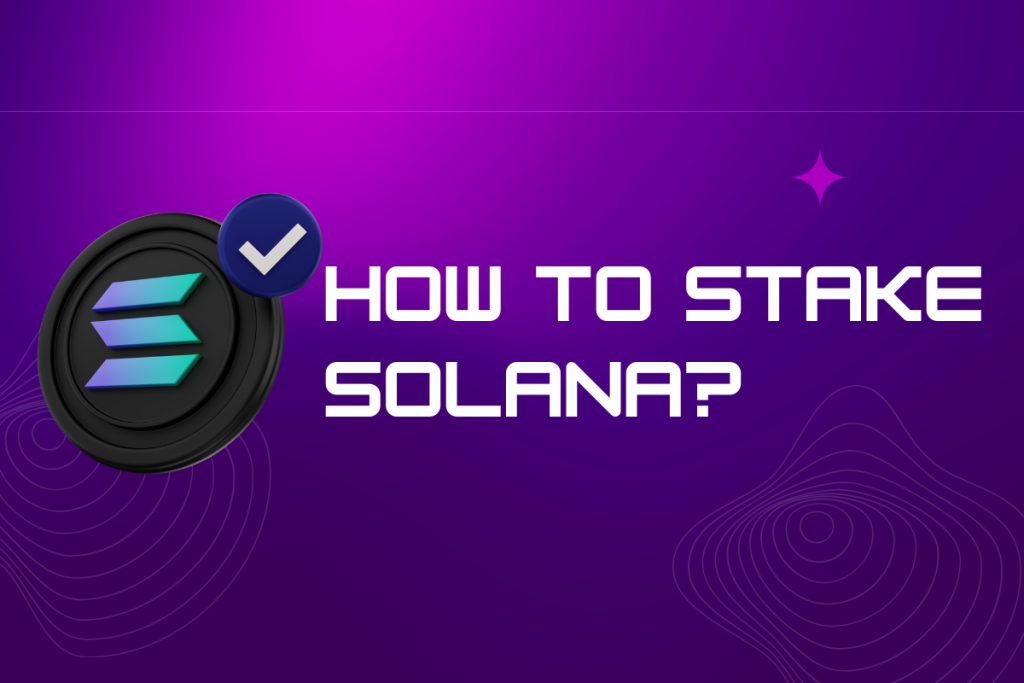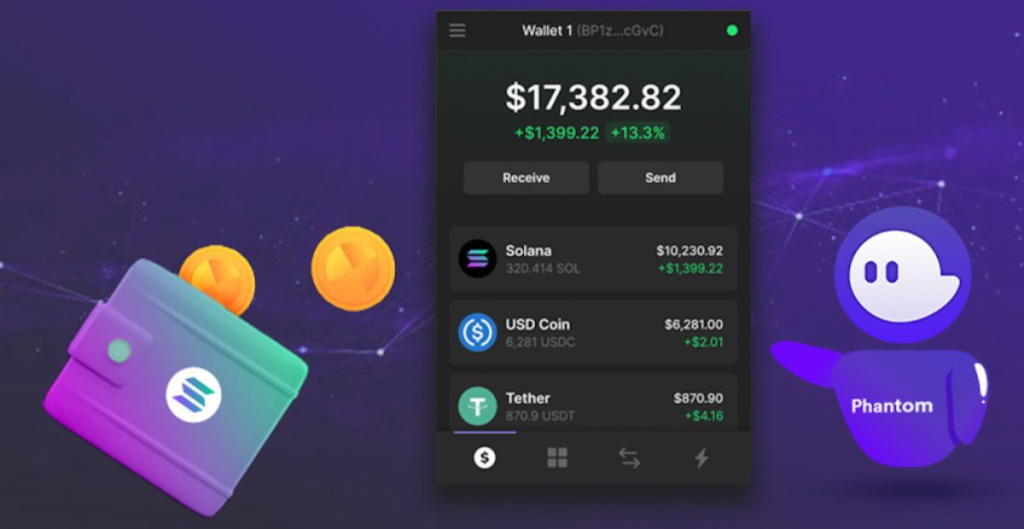Staking has emerged as a fundamental process in the world of blockchain, and Solana, with its rapid growth and innovative capabilities, is no exception. Solana’s network relies on the active participation of token holders who stake their SOL tokens, contributing to the security and consensus of the network. Whether you’re a Solana enthusiast or a newcomer exploring the world of staking, understanding how to stake your SOL tokens is crucial for maximizing your participation in the Solana ecosystem.
In this comprehensive guide, we will walk you through the process of staking SOL tokens on the Solana network. We will cover everything from setting up a Solana wallet to choosing a staking provider and delegating your tokens. Additionally, we will discuss the benefits of staking, including earning rewards for your contributions and ensuring the integrity of the network.
Whether you’re a Solana enthusiast eager to deepen your involvement in the ecosystem or a newcomer looking to understand the fundamentals of staking, this guide aims to equip you with the knowledge and guidance necessary to stake your SOL tokens effectively. By the end of this journey, you’ll have the tools to make informed decisions, actively contribute to the Solana network’s security, and maximize your rewards as a valued member of the staking community. Let’s dive in and unlock the power of staking on Solana!

Table of Contents
Getting Started with Solana Staking
To embark on your staking journey with Solana, there are a few essential steps you need to take. In this section, we will guide you through the process of setting up a Solana wallet and choosing a staking provider, ensuring you have the necessary tools to begin staking your SOL tokens.
Setting up a Solana Wallet
Before you can stake your SOL tokens, you need to have a Solana wallet. There are several user-friendly wallet options available that support Solana. Here are the basic steps to set up your wallet:
- Research wallet options: Explore wallet providers such as Phantom wallet, Ledger, and Solflare. Compare their features, security measures, and user interfaces to find the one that best suits your needs.
- Create a wallet: Visit the website of your chosen wallet provider and follow the instructions to create a new wallet. This typically involves generating a seed phrase or a private key. It’s crucial to store this information securely, as it grants access to your wallet.
- Back up your wallet: Once your wallet is created, it’s essential to create a backup of your seed phrase or private key. Write it down on paper and store it in a safe place. This backup ensures that you can recover your wallet if needed.
- Fund your wallet: After setting up your wallet, you’ll need to transfer SOL tokens to it. You can acquire SOL tokens from cryptocurrency exchanges that support Solana.

Choosing a Solana Staking Provider
With your Solana wallet ready, the next step is to select a staking provider. Staking providers facilitate the delegation process, allowing you to delegate your SOL tokens to validators who will handle the staking on your behalf. Consider the following factors when choosing a staking provider:
- Reputation and security: Research the reputation and track record of the staking provider. Look for reviews, community feedback, and their experience in the Solana ecosystem. Security should be a top priority, as you want to ensure the safety of your tokens.
- Rewards and fees: Compare the staking rewards and fees offered by different providers. Higher rewards and lower fees can significantly impact your overall staking experience.
- User interface and user experience: Evaluate the staking provider’s interface and user experience. A user-friendly platform will make the delegation process smoother and more accessible.
- Validator selection: Staking providers offer a range of validators to delegate your tokens to. Research the validators available through the staking provider and consider their performance, reputation, and community support.
Delegating Your SOL Tokens
Once you have selected a staking provider, you are ready to delegate your SOL tokens. Delegation involves selecting a validator and entrusting them with your tokens to participate in the staking process. Here’s how to delegate:
a. Access your Solana wallet: Open your Solana wallet using the provided seed phrase or private key.
b. Connect to the staking provider: Within your wallet interface, look for the option to connect or integrate with the chosen staking provider. This will establish a secure connection between your wallet and the staking provider’s platform.
c. Choose a validator: From the staking provider’s interface, review the available validators and their performance metrics. Select a validator that aligns with your preferences and has a strong track record.
d. Delegate your tokens: Follow the staking provider’s instructions to delegate your SOL tokens to the chosen validator. This typically involves specifying the amount of SOL you wish to delegate and confirming the transaction.
Congratulations! You have successfully set up a Solana wallet, selected a staking provider, and delegated your SOL tokens to a validator. In the next sections, we will delve deeper into staking rewards, risks, and strategies to help you make informed decisions and optimize your staking experience on the Solana network.
Best Solana Staking Platforms (Pools) List
Here is some popular platforms where you can delegate Sol tokens for staking:
| Platform | Website | Description |
|---|---|---|
| Solana Beach | solanabeach.io | User-friendly staking platform with a simple interface. |
| Solflare | solflare.com | Non-custodial wallet and staking platform for Solana. |
| Binance | binance.com | Leading cryptocurrency exchange offering Solana staking. |
| Kraken | kraken.com | Prominent cryptocurrency exchange supporting Solana staking. |
Risks and Considerations while staking Solana
While staking SOL tokens on the Solana network offers various benefits, it’s important to be aware of the risks involved and exercise caution throughout the process. Understanding these risks and considering them carefully will help you make informed decisions and manage your staked tokens effectively. Here are some key risks and considerations to keep in mind:
- Slashing Risk: Slashing refers to the penalty imposed on validators or delegators for malicious behavior or downtime. If the validator you have delegated to engages in activities that violate the network’s rules or compromises its security, both the validator and the delegators associated with them may face slashing penalties. These penalties can result in a reduction or loss of staked tokens. Therefore, it is crucial to carefully select reputable validators with a strong track record and commitment to network security.
- Unstaking Periods: When you delegate your SOL tokens, there are usually unstaking periods during which your tokens are locked and inaccessible. The length of the unstaking period varies depending on the staking provider and can range from a few hours to several days.
It’s important to be aware of these unstaking periods and plan accordingly, as you won’t be able to immediately access or transfer your staked tokens during this time. Consider your liquidity needs and the potential impact of unstaking periods before delegating a significant amount of SOL tokens. - Network and Validator Risks: As with any blockchain network, there are inherent risks associated with network security, software vulnerabilities, and potential attacks. While Solana has demonstrated strong resilience, it’s important to stay informed about any network or validator risks that may arise. Stay engaged with the Solana community, follow updates from the Solana development team, and consider the reputation and security practices of the validators you delegate to.
- Impermanent Loss (For Liquidity Providers): If you choose to participate in liquidity provision or yield farming through decentralized finance (DeFi) protocols on Solana, there may be a risk of impermanent loss. Impermanent loss occurs when the value of the tokens you provide as liquidity diverges significantly from their initial ratio. It’s important to understand the dynamics of the particular liquidity pool you’re participating in and assess the potential risks before engaging in liquidity provision strategies.
- Market Volatility: The value of SOL tokens and the rewards earned from staking can be subject to market volatility. Cryptocurrency markets are known for their price fluctuations, and it’s important to consider the potential impact of market volatility on your staked tokens and rewards. While staking can provide additional earnings through rewards, it’s important to assess your risk tolerance and make decisions based on a long-term perspective.
- Reputation and Performance Risks: The reputation and performance of the staking provider and validator you choose can impact the security and reliability of your staked tokens. Conduct thorough research on the staking provider, validator’s track record, community support, and performance metrics before delegating your SOL tokens. Stay informed and consider adjusting your delegation if the validator’s performance or reputation deteriorates over time.
By being aware of these risks and considering them carefully, you can take proactive measures to mitigate potential losses and make informed decisions when staking your SOL tokens. Stay informed, engage with the Solana community, and regularly evaluate the performance and security of your chosen validators to ensure a positive staking experience on the Solana network.
Maximizing Staking Rewards
Staking SOL tokens on the Solana network not only contributes to the security and consensus of the network but also allows you to earn rewards for your participation. Maximizing your staking rewards requires a thoughtful approach and consideration of various factors. Here are some key strategies and best practices to help you optimize your staking rewards on Solana:
- Choose Well-Performing Validators: Selecting reputable and well-performing validators is crucial for maximizing your staking rewards. Look for validators with a history of consistent performance, high uptime, and reliable infrastructure. Research their track record, community reputation, and any additional services they offer, such as regular updates and communication. Validators with a strong commitment to network security and a history of generating consistent rewards can enhance your overall staking experience.
- Diversify Your Delegations: Consider diversifying your delegations among multiple validators instead of putting all your staked tokens with a single validator. By spreading your stake across multiple validators, you reduce the risk associated with the performance of any single validator. Diversification can help mitigate the impact of slashing penalties or underperforming validators, providing a more stable and potentially higher overall return on your staked tokens.
- Stay Informed About Rewards and Fees: Regularly monitor the rewards and fees offered by validators and staking providers. Rewards and fees can vary among different validators, and staying informed about these rates will help you make informed decisions. Consider validators that offer competitive rewards while maintaining reasonable fees. However, it’s important to strike a balance between high rewards and the reputation and security of the validators.
- Participate in Governance: Some staking providers and networks offer governance participation, allowing token holders to actively participate in decision-making processes. By engaging in governance activities, such as voting on proposals or participating in community discussions, you can potentially earn additional rewards. Participating in governance not only contributes to the decentralized nature of the network but also provides an opportunity to have a say in the network’s future and potentially earn extra rewards.
- Stay Updated with the Solana Ecosystem: Keep yourself informed about the latest developments, projects, and opportunities within the Solana ecosystem. Solana has a vibrant and rapidly evolving ecosystem with various decentralized applications (dApps), decentralized finance (DeFi) protocols, and innovative projects. By staying updated and exploring different opportunities, you may discover additional ways to generate rewards beyond traditional staking. Keep an eye on new staking products, yield farming opportunities, or liquidity provision strategies to diversify and enhance your staking rewards.
- Long-Term Perspective: Staking rewards are typically distributed periodically, and the staking process requires a certain degree of commitment. Adopting a long-term perspective can be beneficial when staking SOL tokens. Instead of focusing solely on short-term gains, consider the potential for compounding rewards over time. By consistently staking and reinvesting your rewards, you can increase your overall staked balance and potentially enhance your long-term staking returns.
Remember, while maximizing staking rewards is important, it’s equally essential to consider the reputation, security, and overall health of the Solana network. Balance your reward optimization strategies with the need to contribute to a secure and decentralized network. By implementing these strategies and staying engaged with the Solana community, you can actively participate in the network while maximizing your staking rewards on the Solana network.
Solana Staking Calculator
Make informed decisions about staking your Solana (SOL) tokens with our easy-to-use staking calculator. This calculator helps you estimate potential staking rewards based on your staked amount, reward rate, and staking period.
By entering the relevant information, you can quickly get an estimate of the rewards you might earn from staking SOL tokens.
Please note that the calculated rewards are for informational purposes only and may not reflect actual results. Remember to consider factors such as market conditions, fees, and the performance of validators when making staking decisions. Use the Solana Staking Calculator to gain insights into the potential rewards of staking and optimize your staking strategy.
Solana Staking Calculator
Frequently Asked Questions (FAQs)
What is staking on the Solana network?
Staking on the Solana network involves locking up your SOL tokens to support the network’s security and consensus mechanism. By staking your tokens, you contribute to block validation and transaction processing, and in return, you earn rewards.
How are staking rewards calculated?
Staking rewards are typically calculated based on the amount of SOL tokens you have staked and the validator’s reward rate. The reward rate can vary among validators and is often expressed as an annual percentage yield (APY). The rewards are distributed periodically, and the frequency may depend on the staking provider.
Can I unstake my tokens at any time?
Unstaking your tokens usually involves an unstaking period during which your tokens are locked and inaccessible. The length of the unstaking period varies depending on the staking provider. Be aware of the unstaking periods associated with your delegation and plan accordingly.
Can I delegate my SOL tokens to multiple validators?
Yes, many staking providers allow you to delegate your SOL tokens to multiple validators. Diversifying your delegations can help mitigate risks and potentially increase your overall staking rewards.
Can I adjust my delegation or switch validators?
Many staking providers allow you to adjust your delegation or switch validators within their platform. However, there may be unbonding or unstaking periods associated with making such changes. Consider the implications and any associated risks before adjusting your delegation.
What is the minimum amount of SOL required for staking?
The minimum amount of SOL required for staking can vary depending on the staking provider. Some providers have minimum delegation requirements, so it’s important to check the specific requirements before delegating your SOL tokens.
Can you mine Solana?
No, Solana does not support mining in the traditional sense. Solana is a proof-of-stake (PoS) blockchain, which means that new blocks and transaction validations are carried out by validators who hold and stake SOL tokens. Validators are chosen through a process called “proof of history” and are responsible for maintaining the network’s security and consensus.
Can you stake Solana on ledger?
Yes, you can stake Solana (SOL) tokens using Ledger hardware wallets. Ledger Live, the official software application for managing Ledger devices, supports staking for various cryptocurrencies, including Solana.
Conclusion
Staking SOL tokens on the Solana network can be a rewarding and engaging experience. By actively participating in the staking process, you not only contribute to the security and consensus of the network but also have the opportunity to earn rewards for your stake. Throughout this guide, we have covered the fundamental aspects of staking on Solana, including setting up a wallet, choosing a staking provider, delegating SOL tokens, understanding risks, and maximizing staking rewards.
As you embark on your staking journey, remember to conduct thorough research, carefully select reputable validators, and diversify your delegations to mitigate risks. Stay informed about the latest developments in the Solana ecosystem, engage with the community, and actively monitor the performance of your chosen validators. By adopting a long-term perspective and considering best practices, you can optimize your staking rewards and actively contribute to the growth and security of the Solana network.
However, it is important to note that staking, like any investment activity, carries inherent risks. It’s crucial to assess your risk tolerance, understand the potential rewards and risks involved, and make informed decisions based on your own financial situation and objectives. If you have any doubts or concerns, consult with professionals or seek advice from the Solana community.
By actively participating in the Solana staking community, you become an integral part of the network’s success. Your engagement helps strengthen the decentralization and security of Solana, contributing to its long-term sustainability and growth. Embrace the opportunities that staking on Solana offers, explore the diverse ecosystem, and enjoy the benefits of earning rewards while actively participating in the future of blockchain technology.
Happy staking on the Solana network!

An experienced leader in software engineering and technology, I’ve driven value for top-tier Fortune 100 and 500 clients as the former CTO of Big Drop Inc. Overseeing a global team, we secured 34 global awards for pioneering web design using our proprietary tech. As the Co-Founder of Motion Design School, I created an innovative platform for global artists. Now, I apply my expertise to the dynamic world of blockchain, leveraging years of experience to shape decentralized technology’s future.